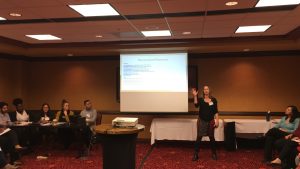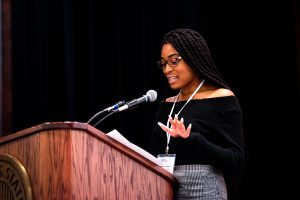The fourth annual Culturally Responsive Campus Community (CRCC) Conference was held on November 18 and 19 at Illinois State University. The overall mission of the annual CRCC Conference is to enlighten, educate, and ignite conversation around creating a more equitable and just campus environment for all. This year’s conference theme was “Building Solidarity Across Movements.”
With over 700 students, staff, and community members registered to attend, participants chose from 60 presentations, workshops, and discussions during the conference. Topics over the two days included working with international students, cultivating social justice learning through art and creative writing, anti-Blackness, Trans advocacy, diverse learning environments, fighting racial inequity, and challenging the norms of sexual violence.
There is something unspeakably beautiful about spending two days learning and connecting with passionate, intelligent, and caring people whose life work is that of justice. Unsurprisingly, many of the National Center for Urban Education (NCUE) staff, affiliated faculty, students, and community partners had a hand in various aspects of the conference.
CRCC Program Chair and NCUE-affiliated faculty Dr. Shamaine Bertrand and others questioned: “What if we begin to build a sustainable movement across campus?” Dr. April Mustian, CRCC Chair and Director of Faculty Development and INFUSE Coordinator for NCUE, stated the conference was aimed to “be clear and honest about what is still standing in the way of reaching solidarity.”
NCUE staff and community partners heard this call and led two workshops during the conference. The first session was titled “Cultivating an Understanding of Neuroscience to Empower Urban School Communities.” Jennifer O’Malley, Director of the Chicago Teacher Education Pipeline (CTEP) at NCUE along with Chicago community partners: Brienne Ahearn of North River Commission, Carlos Millan of The Resurrection Project, Ana Mosqueda of Latinos Progresando, and Gynger Garcia of Breakthrough shared how an understanding of fundamental concepts in brain development can empower educators. They affirmed that when neuroscience concepts are partnered with community knowledge, educators can bring empathy to any learning space to be truly culturally responsive.
The second NCUE workshop, led by CTEP Induction & Mentoring Director Apryl Riley, Melanie Christion of Greater Auburn Gresham Development Corporation, and Jose Guerrero, former CTEP staff and current Chicago Public Schools teacher, centered on restorative practices. Titled “Promoting Equity and Teaching Empathy Through Restorative Circle Practices”, the presentation showed how restorative practices are transformative ways to communicate with others and are intended to support and keep people accountable. Specifically, this presentation asserted that restorative circle practices are profound tools to integrate into urban education environments, K-12 classrooms and beyond. Restorative practices, characterized by awareness and intentionality, allow teachers and students to communicate more effectively with each other, and ultimately achieve a more equitable classroom.
The CRCC conference serves to ensure ISU and the surrounding community continues to commit to an inclusive, equitable, and culturally responsive campus. Genesis Robinson, a junior education major and two-time NCUE STEP-UP program alum, echoed this sentiment during her remarks to the conference audience attending the student-led session “The Roots of Anti-blackness.”
“The way some people experience an institution is not the same as how others experience an institution. I think events like this shed light on that fact and how we need to see things from different perspectives,” Robinson said.
NCUE is proud to be associated with such great leaders across our communities. Together, we aim to create a more just and equitable world for all.



